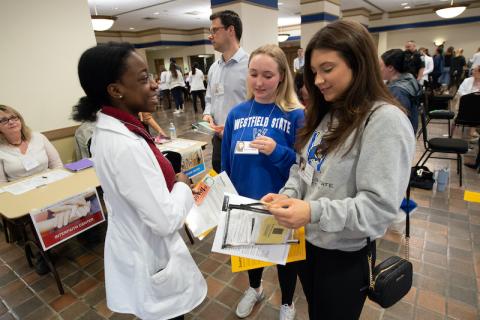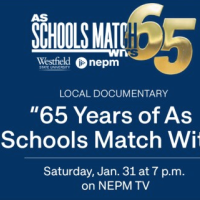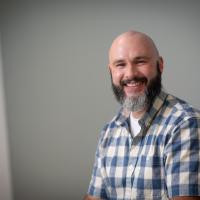
Poverty Simulation Creates Awareness on Resources for Future Healthcare Providers

According to the U.S. Census Bureau 38 million Americans are living in poverty. These individuals and families are often hidden from view, and those who are willing to assist are often unaware of the resources available to provide aid.
On April 19, Westfield State students took part in a “Community Action Poverty Simulation,” an interactive program organized by Westfield State's Interprofessional Health Equity Planning Board, which is headed by Nora Padykula and consists of members from the various health departments on campus, as well as outside stakeholders.
The exercise was designed to emulate some of the challenges faced by those living in poverty. The simulation effort also focused on creating awareness around those experiencing poverty as well as challenging participants to discover available programs and resources that offer assistance.
In the exercise, students were separated into groups and assigned varying levels of wealth. They were then tasked with utilizing available funds, and “live” each day according to their budgets.
Godfrey Macadangdang, a nursing major, admitted the event to be a “real eye-opener” to some of the constant and conceptual barriers faced by individuals experiencing poverty.
“It was very stressful to be put in a position where you start off with little to no resources to survive the month, may encounter more difficulties, and knowing the chances of escaping this position seem impossible,” he said.
Macadangdang indicated having this knowledge is critical to effectively practice as a care provider.
“Moving forward with my nursing career, I believe it's important for me to be knowledgeable of the available resources to help people living in poverty and share this knowledge. This information should be free and easily accessible to anyone.”
For first-year physician assistant major Corina Lindsay’s simulation, balancing responsibility for her siblings with the need to make ends meet was challenging. “In my situation, I had two 13-year-old siblings who ended up having to skip school just so they can go to the pawnshop and get us enough money for groceries.”
The poverty simulation, according to Lindsay, helped to show the importance of resources and education around aid available for those in need. During her simulation, she was unaware of systems put in place to aid struggling families, which made it harder to survive. She also stressed the significance for healthcare providers to be aware of these systems in order to best aid their patients.
The simulation also created awareness around the inherent flaws built into some of these systems, which requires “complex, varying requirements” to navigate bureaucratic barriers.
Edward Krajkowski, a physician assistant major, said he now better understands “the interplay between health and social determinants of health,” citing a lack of education surrounding resources in addition to meeting the standards of each resource in order to receive aid.
“I think the facilitators did an amazing job of capturing the frantic feeling of trying to make ends meet and the frustration of struggling against a nearly insurmountable problem,” he said. “I had started the first day of the simulation with a clear plan and goals, these were quickly thrown out the window as I tried to navigate the bureaucracy around government benefits.”
As with the others, he said he is now more aware of resources and layered, socioeconomic obstacles as he moves forward with his education.
Lindsay summed up her experiences by reinforcing the importance of collaborative gatherings such as the simulation, asking others to be mindful of the pervasive issue of widespread poverty.
“I think it’s important to recognize that poverty in the U.S. is an issue and it has a huge impact on day-to-day lives. Being able to recognize that this as an issue and figure out ways in which we can help improve lives is incredibly important, and this simulation did an amazing job raising awareness,” she said.
Moving forward, the Interprofessional Health Equity Planning Board intends to hold this event at least once a year and expand to include other disciplines and departments in the collaboration.


